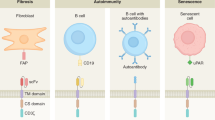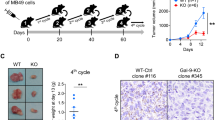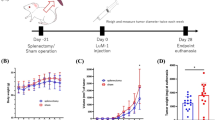Abstract
Mice transplanted with NC carcinoma were treated with the thromboxane synthetase inhibitor dazmegrel (UK38485) or with nafazatrom (BAY G 6575), a compound that is reported to increase prostacyclin formation. Some experiments included the cytotoxic drugs methotrexate and melphalan. The tumours were excised under anaesthesia on day 14 or day 21 after transplantation, and weighed; some were extracted for prostanoids which were measured by radioimmunoassay. Mouse survival time was determined up to day 121, and cancer spread was determined by postmortem examination. The survival was increased by methotrexate and melphalan but not by the other drugs. Nafazatrom-treated mice tended to have lighter tumours. Although dazmegrel reduced the formation of thromboxane B2 during clotting of blood from normal mice, it did not affect the tumour yields of prostanoids. Nafazatrom had no effect on serum or tumour prostanoids. There were no obvious effects of the treatments on the recurrence of tumour in the excision scar, lung metastasis or spread to lymph nodes.
This is a preview of subscription content, access via your institution
Access options
Subscribe to this journal
Receive 24 print issues and online access
$259.00 per year
only $10.79 per issue
Buy this article
- Purchase on Springer Link
- Instant access to full article PDF
Prices may be subject to local taxes which are calculated during checkout
Similar content being viewed by others
Rights and permissions
About this article
Cite this article
Stamford, I., Melhuish, P., Carroll, M. et al. Survival of mice with NC carcinoma is unchanged by drugs that are thought to inhibit thromboxane synthesis or increase prostacyclin formation. Br J Cancer 54, 257–263 (1986). https://doi.org/10.1038/bjc.1986.171
Issue Date:
DOI: https://doi.org/10.1038/bjc.1986.171
This article is cited by
-
Expression of thromboxane synthase, TBXAS1 and the thromboxane A2 receptor, TBXA2R, in human breast cancer
International Seminars in Surgical Oncology (2005)



